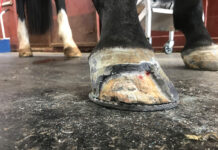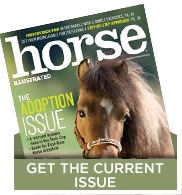One of the more dreaded health problems faced by horse owners is colic. While many colic episodes are relatively minor and resolve quickly with or sometimes without veterinary intervention, colic can also take on a more serious form requiring surgery or possibly ending in death.
In a recent study in the United Kingdom, risk factors for recurrent colic were examined in 59 recurrent colic cases compared to 177 control horses that did not experience colic. A horse with a repeat colic episode is one that had a recurrent case of colic anytime from 48 hours to one year following the original onset. Several correlations were made, and other potential links uncovered that are worthy of further examination.

The Benefits of Turnout
The most obvious link was the positive correlation with pasture turnout: Horses with daily pasture access had a much-reduced incidence of recurrent colic. This is not surprising since equine intestinal health is promoted by eating habits that favor small amounts consumed regularly and intermittently throughout day and night. So, a horse with the ability to supply continual small amounts of forage to his stomach and intestinal tract is a horse that is following the dictates of his normal evolutionary predilection as a “trickle feeder.”
In addition to the forage obtained from pasture, horses are often turned out in a group of horses, which gives them the necessary social interactions and playtime that are important behavioral expressions of herd animals. It is likely that this freedom of turnout reduces stress while at the same time satisfying specific behavioral and psychological requirements.
Vices and Colic
One notable finding in the study was that stereotypies (repetitive vices) such as cribbing or weaving had a high association with repeat colic. In a previous study, horses with dental problems also seemed more prone to recurrent colic. The good news is that horses with these kind of repetitive behaviors can be turned out to pasture and attain beneficial effects – pasture reduced the recurrent colic events in this study.
Keep in mind that anytime diet is altered, the horse should be given 2-3 weeks of slow adjustments until his digestive tract has accommodated the changes. So, you wouldn’t just turn the horse that is not used to pasture out on pasture; instead, spend a few weeks slowly acclimating him to steadily increasing periods of time until he can be on pasture for 6-12 continuous hours, or whatever is appropriate for your situation.
For horses that have physiologic issues like equine metabolic syndrome or Cushing’s disease, pasture may not be a possible option, or at the very least, the horse should wear a grazing muzzle during turnout. As for dental work – this is easily remedied with once or twice yearly veterinary visits to perform dental work to improve chewing and digestion of food.
Other possible links were found in this study: Horses fed probiotics seem to have a higher incidence of recurrent colic. Horses with stereotypic behaviors that were fed apples or carrots seemed to have a reduced incidence. The researchers cautioned that both these issues need further investigation before conclusions are made.
Read more on stabled horses and colic >>
Parasites and Colic
Previous research has also identified intestinal parasitism as a cause of recurrent colic, and so deworming strategies continue to be important to intestinal health. It is best to have your veterinarian run a fecal egg count once or twice a year and thereby develop an individual parasite control program for your horse.
Medical Causes of Colic
Those having had surgery are more prone to a repeat, often due to adhesions (scar tissue) in the bowel. Chronic NSAID (non-steroidal anti-inflammatory drugs) like phenylbutazone or flunixin meglumine are known to induce stomach and/or colonic ulcers, which contribute to colic. Another cause of chronic colic is persistent ingestion of “sand” when fed on the ground or in over-grazed pastures. And, let us not forget that high-grain diets are highly fermentable and can lead to painful gas colic, which could progress to a more serious colon displacement.
Good management strategies – strategic deworming protocols, excellent dietary management that maximizes forage and minimizes grain, providing feeder systems that protect against sand ingestion – and maximizing lifestyles to which horses evolved – freedom of movement, exercise, herd interaction – are keys to successful management of every horse, and in particular those with recurrent colic.
Liked this article? Here are others you’ll enjoy:
7 Tips for Preventing Colic
Making the Colic Call
Preventing Cold Weather Colic






cool
Great advice. So important to watch what our horses eat.